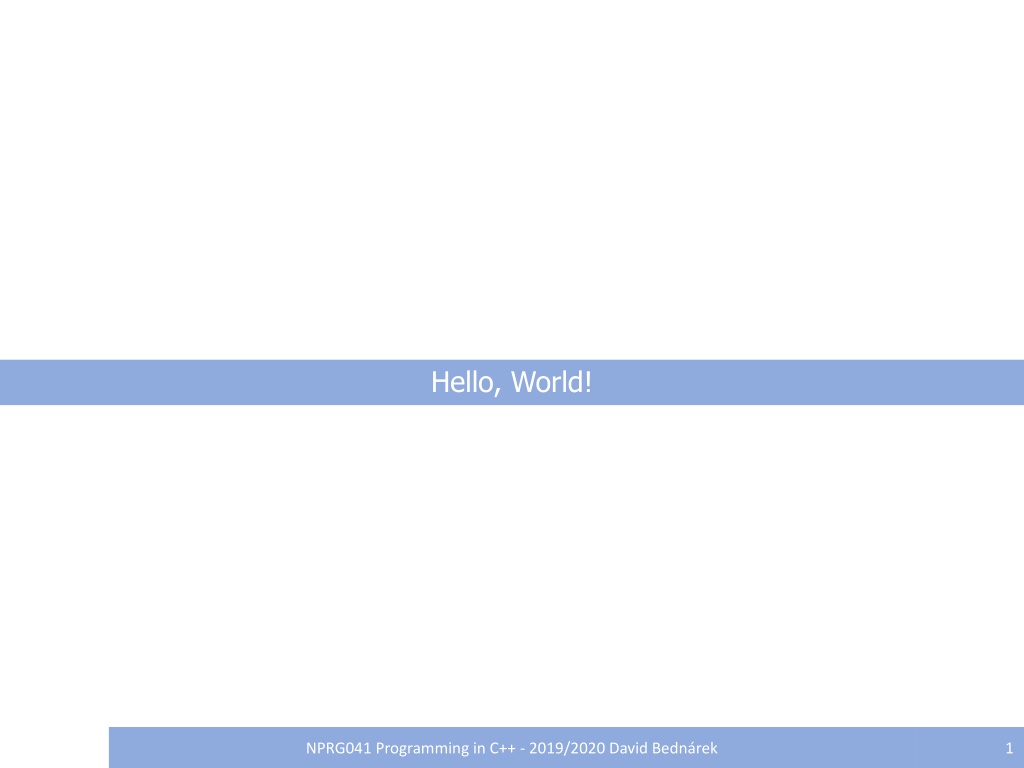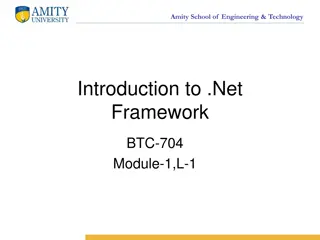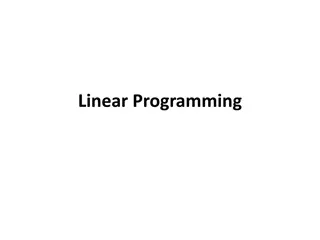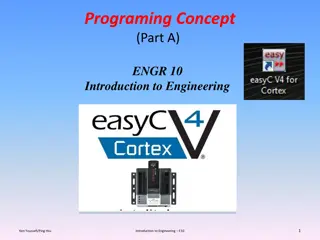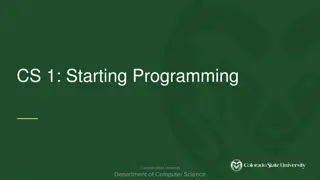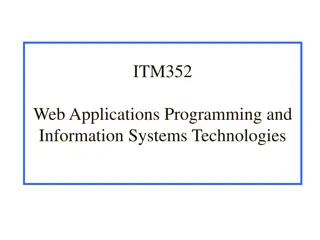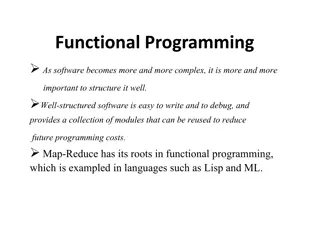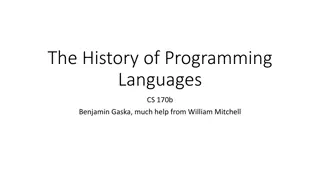Introduction to Programming in C++ with Hello, World!
Programming in C++ involves using the standard library namespace, defining the program entry point with the main function, handling command-line arguments, and module interfaces. The traditional Hello, World! program showcases the basics of C++ syntax and structure, emphasizing concepts like global functions, data types, pointers, and the standard output mechanism. With the evolution of C++20 modules, the language introduces new ways to organize code and interface with modules, setting the stage for modern software development practices.
Download Presentation

Please find below an Image/Link to download the presentation.
The content on the website is provided AS IS for your information and personal use only. It may not be sold, licensed, or shared on other websites without obtaining consent from the author. Download presentation by click this link. If you encounter any issues during the download, it is possible that the publisher has removed the file from their server.
E N D
Presentation Transcript
Hello, World! NPRG041 Programming in C++ - 2019/2020 David Bedn rek 1
Hello, World! Program entry point Heritage of the C language No classes or namespaces Global function "main" argc, argv (traditional names) Command-line arguments Split to pieces Archaic data types Pointer to pointer to char Logically: array of strings "Forgotten" const modifier Modern C++ interface would be std::size_t argc, const char * const * argv or std::size_t argc, const std::string_view * argv or const std::string_view * arg_begin, const std::string_view * arg_end or std::ranges::input_range auto arg #include <iostream> int main( int argc, char * * argv) { std::cout << "Hello, world!" << std::endl; return 0; }
Hello, World! std - standard library namespace C++ uses :: instead of . for non-objects on the left cout - standard output global variable << - stream output "misused" overloaded operator not std::<< although inside std Argument Dependent Lookup endl - line delimiter global function (archaic trick) "\n" works too But endl works in all 8/16/32-bit encodings iostream standard header file no .h or .hpp suffix! non-standard header files shall have a suffix cout, <<, endl declared inside enclosed in namespace std { } #include <iostream> int main( int argc, char * * argv) { std::cout << "Hello, world!" << std::endl; return 0; }
Hello, World! More than one module Module interface described in a file .hpp - "header" file The defining and all the using modules shall "include" the file Text-based inclusion Compiler config specifies folders // world.hpp #ifndef WORLD_HPP_ #define WORLD_HPP_ void world(); // a declaration #endif // world.cpp #include "world.hpp" #include <iostream> // main.cpp #include "world.hpp" int main( int argc, char * * argv) { world(); // a use return 0; } void world() // the definition { std::cout << "Hello, world!" << std::endl; }
Hello, World! in C++20 modules // world.ixx C++20 modules export, module, import clauses The suffix .ixx of module interface files is Microsoft-specific export module world; export void world(); // a declaration Standard library in new form Only Microsoft implements the standard import std.core clause (in 2023) Others do it differently: import <iostream> // world.cpp // main.cpp module world; import world; import std.core; int main( int argc, char * * argv) { world(); // a use return 0; } void world() // the definition { std::cout << "Hello, world!" << std::endl; }
Hello, World! .hpp - "header" files contain Definitions of types, classes, constants, inline functions and inline static variables Declarations of non-inline functions and non-inline static variables .cpp "source" files contain Definitions of non-inline functions and non-inline static variables // world.hpp #ifndef WORLD_HPP_ #define WORLD_HPP_ #include <vector> #include <string> // a type definition: using t_arg = std::vector<std::string>; // a function declaration: void world(const t_arg & arg); #endif // world.cpp #include "world.hpp" #include <iostream> // main.cpp #include "world.hpp" // a function definition: int main( int argc, char * * argv) { // a local variable definition: t_arg arg(argv + 1, argv + argc); // statements: world(arg); return 0; } // a function definition: void world( const t_arg & arg) { std::cout << "Hello"; // another local variable: for ( auto && x : arg ) std::cout << "," << x; std::cout << std::endl; }
Hello, World! .hpp - "header" files contain Definitions of types, classes, constants, inline functions and inline static variables Functions and static variables defined inside class/struct are implicitly inline Header-only modules Not compiled alone Not a module in binary sense // world.hpp #ifndef WORLD_HPP_ #define WORLD_HPP_ #include <vector> #include <string> // a type definition: using t_arg = std::vector<std::string>; // a function definition: inline void world(const t_arg & arg) { std::cout << "Hello"; // another local variable: for ( auto && x : arg ) std::cout << "," << x; std::cout << std::endl; } // main.cpp #include "world.hpp" // a function definition: int main( int argc, char * * argv) { // a local variable definition: t_arg arg(argv + 1, argv + argc); // statements: world(arg); return 0; } #endif
Declarations and definitions Declarations of functions Inline, implicitly inline, and non-inline definitions of functions pure virtual functions have no definitions (called abstract in other languages) // m.hpp #ifndef M_HPP_ #define M_HPP_ void f1(); inline void f2() {} class C { void f3(); void f4(); virtual void f5(); virtual void f6()=0; static void f7(); void f8() {} }; inline void C::f3() {} // inline member function definition inline void C::f7() {} // inline static member function definition // global function declaration // inline global function definition // class definition // member function declaration // member function declaration // virtual member function declaration // pure virtual member function declaration // static member function declaration // implicitly inline member function definition #endif // m.cpp #include "m.hpp" void f1() {} void C::f4() {} void C::f5() {} // non-inline global function definition // non-inline member function definition // non-inline virtual member function definition
Declarations and definitions Declarations/definitions of variables non-static member and local variables have only definitions Beware: (non-static member and local) variables of number and (raw) pointer types are NOT implicitly initialized! // m.hpp #ifndef M_HPP_ #define M_HPP_ extern int v1; inline int v2; inline int v3=3; inline int v4(4); inline int v5{5}; class C { int v6; int v7=7; static int v9; static int v10; inline static int v11; inline static int v12=12; // inline static member variable definition }; inline int C::v9=9; // inline static member variable definition // global variable declaration // inline global variable definition // inline global variable definition // inline global variable definition // inline global variable definition // class definition // member variable definition (not initialized) // member variable definition // static member variable declaration // static member variable declaration // inline static member variable definition #endif // m.cpp #include "m.hpp" int v1; int C::v10; int & f() { static int v11=0; return v11; } // static local variable definition // non-inline global variable definition // non-inline static member variable definition
Declarations and definitions Declarations and definitions of class/struct class B; // class declaration class A { public: virtual B * get_B() { return nullptr; } static std::unique_ptr<B> create_B(); // static member function declaration }; // class definition // virtual member function definition // declaration of B is sufficient here class B : public A { private: virtual B * get_B() override { return this; } }; // definition of A required here inline std::unique_ptr<B> A::create_B() { // static member function definition return std::make_unique<B>(); } // definition of B required here
Hello, World! t_arg // world.hpp #ifndef WORLD_HPP_ #define WORLD_HPP_ A type alias for "vector of string" using does not create a new type there are also other, unrelated uses of the keyword "using" vector is a container Contains objects, not references! string is similar to vector<char> #include <vector> #include <string> // a type-alias definition: using t_arg = std::vector<std::string>; // a function declaration: void world(const t_arg & arg); #endif The definition of a variable always creates the corresponding object (not a reference to it) no "new" required/possible here it always calls a constructor constructor arguments may be specified in () in this case, there are several layers of tricks and implicit casts for local variables, the object is always destroyed when the scope is exited // main.cpp #include "world.hpp" // a function definition: int main( int argc, char * * argv) { // a local variable definition: t_arg arg(argv + 1, argv + argc); // statements: world(arg); return 0; }
Hello, World! & declares a reference equivalent to passing by reference when used in a function argument const prevents accidental modification of the actual argument in this case, passing by reference is done solely for speed const is required in these cases, otherwise the function could not be called with some kinds of arguments // world.hpp #ifndef WORLD_HPP_ #define WORLD_HPP_ #include <vector> #include <string> // a type definition: using t_arg = std::vector<std::string>; // a function declaration: void world(const t_arg & p); #endif // world.cpp #include "world.hpp" #include <iostream> The for ( : ) statement iterates through the container p declares the variable x its type is a reference to string "auto" means "let the compiler determine the type" not a "reference to anything" - no run-time flexibility or cost x refers to one of the objects stored inside the container arg without the &&, it would be a copy // a function definition: void world( const t_arg & p) { std::cout << "Hello"; // another local variable: for ( auto && x : p ) std::cout << "," << x; std::cout << std::endl; }
Hello, World! &, && declare references The variable behaves as if it was the object referred to x refers to one of the objects stored inside the container arg Logical point of view vector contains strings string contains chars SOME ARG arg p x // world.cpp #include "world.hpp" #include <iostream> // main.cpp #include "world.hpp" // a function definition: int main( int argc, char * * argv) { // a local variable definition: t_arg arg(argv + 1, argv + argc); // statements: world(arg); return 0; } // a function definition: void world( const t_arg & p) { std::cout << "Hello"; // another local variable: for ( auto && x : p ) std::cout << "," << x; std::cout << std::endl; }
Hello, World! &, && declare references The variable behaves as if it was the object referred to x refers to one of the objects stored inside the container arg Physical point of view vector/string dynamically allocates place for the strings/chars S O M E A R G heap arg stack p x // world.cpp #include "world.hpp" #include <iostream> // main.cpp #include "world.hpp" // a function definition: int main( int argc, char * * argv) { // a local variable definition: t_arg arg(argv + 1, argv + argc); // statements: world(arg); return 0; } // a function definition: void world( const t_arg & p) { std::cout << "Hello"; // another local variable: for ( auto && x : p ) std::cout << "," << x; std::cout << std::endl; }
